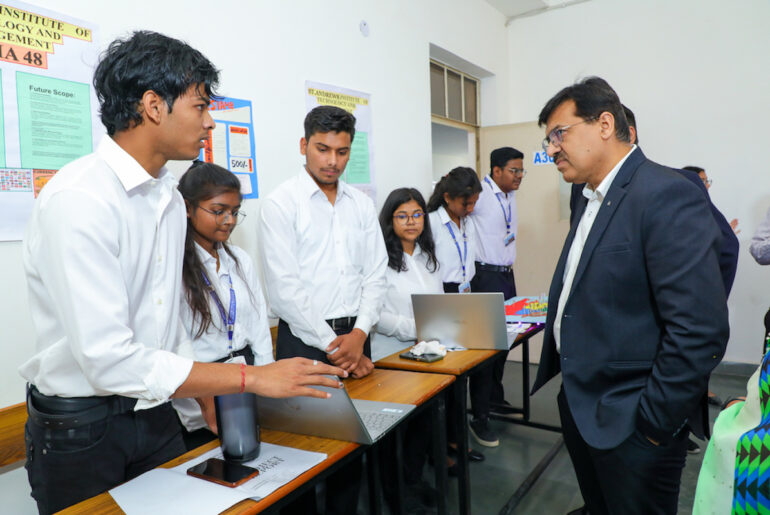CSE Engineering
Computer Science Engineering (CSE) is a discipline that integrates principles of computer science and engineering to design, develop, and implement computing systems. The course curriculum typically includes foundational subjects such as data structures, algorithms, computer architecture, computer engineering, operating systems, and software engineering.
These subjects equip students with a solid understanding of computational theory and practical skills necessary for designing and managing complex software and hardware systems.
Hands-on learning is emphasized through lab sessions, projects, and internships, enabling students to apply theoretical knowledge to real-world problems.
CSE programs also offer opportunities for specialization in areas like artificial intelligence, machine learning, cybersecurity, cloud technology, and mobile app development, reflecting the diverse applications of computer science in modern industries.
Graduates of CSE programs are in high demand across various sectors including IT services, software engineering, telecommunications, finance, healthcare, and gaming. The field encourages innovation and research, contributing to advancements in technology such as AI, robotics, and quantum processing.
Some of the most opted courses in India and St. Andrews college or different Engineering college or Management colleges are as follows:-
Computer Science Engineering Course Duration

The duration of a Computer Science Engineering (CSE) course typically spans four years for an undergraduate program (B.Tech or B.E.), divided into eight semesters.
This structured timeframe includes foundational courses in mathematics, physics, and programming during the initial semesters, followed by advanced subjects such as data structures, algorithms, data networks, and software engineering.
Hands-on experience through lab sessions, projects, and internships complements theoretical learning, preparing students to tackle real-world challenges in the field.
Postgraduate programs such as MTech or M.E. in CSE Engineering may offer extended education for further specialization, depending on the institution and the student’s career aspirations.
Highlights of Computer Science Engineering Course
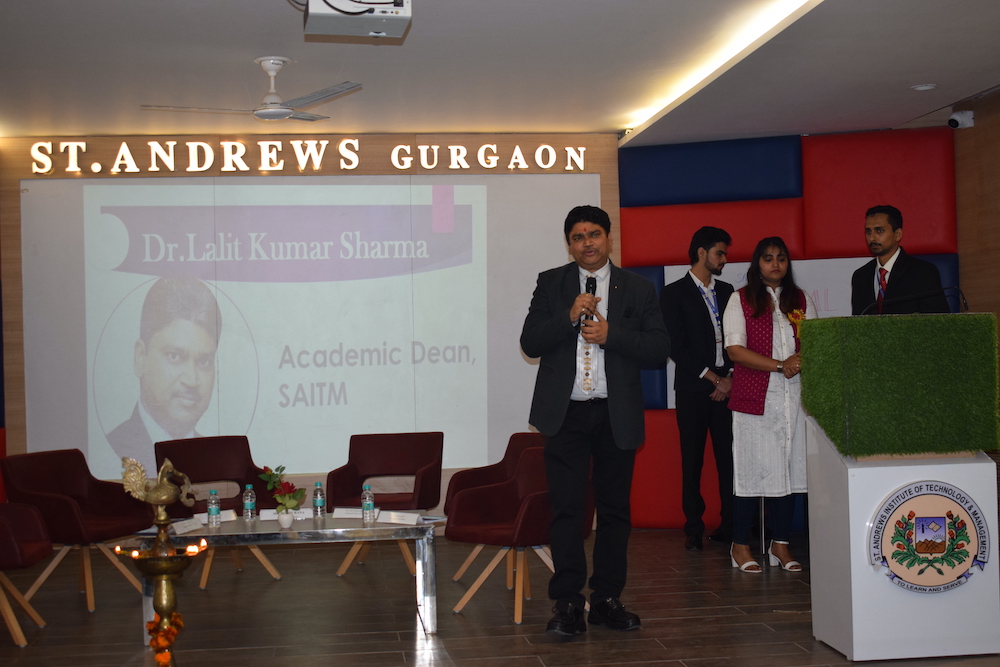
Curriculum and Core Subjects:
- Fundamental Programming: Courses on languages such as C, C++, Java, Python.
- Data Structures and Algorithms: Key concepts for problem-solving and efficient data handling.
- Computer Networks: Understanding of network protocols, design, and security.
- Operating Systems: Insight into OS concepts, processes, and memory management.
- Database Management Systems (DBMS): Techniques for database design, SQL, and data modeling.
- Software Engineering: Principles of software development, project management, and methodologies.
- Artificial Intelligence and Machine Learning: Basics and advanced topics in AI and ML algorithms.
- Web Technologies: Development of web applications, front-end, and back-end technologies.
- Cybersecurity: Concepts of network security, cryptography, and ethical hacking.
Specializations:
- Artificial Intelligence and Machine Learning
- Data Science and Big Data Analytics
- Cybersecurity
- Cloud Computing
- Internet of Things (IoT)
- Software Development and Testing
Practical Exposure:
- Laboratory Work: Hands-on sessions in computer labs for coding, simulations, and project development.
- Projects: Individual and group projects that solve real-world problems using learned concepts.
- Internships: Mandatory internships in tech companies for industry experience.
Industry Collaboration:
- Partnerships with tech companies for curriculum development, internships, and placements.
- Guest lectures and workshops by industry professionals.
Career Opportunities:
- Software Developer/Engineer: Designing and developing software applications.
- Data Scientist: Analyzing and interpreting complex data to help companies make decisions.
- Network Engineer: Managing and maintaining computer networks.
- Cybersecurity Analyst: Protecting systems and networks from cyber threats.
- AI/ML Engineer: Developing intelligent algorithms and models.
- Cloud Solutions Architect: Designing cloud-based solutions for businesses.
- System Analyst: Analyzing and improving IT systems within organizations.
Higher Studies and Certifications:
- Pursuing M.Tech, MS, or PhD in specialized areas.
- Certifications like AWS Certified Solutions Architect, Certified Information Systems Security Professional (CISSP), and others.
Modern Facilities and Learning Resources:
- Access to state-of-the-art computer labs and software tools.
- Online resources, e-books, and access to research journals.
Extracurricular Activities:
- Coding competitions, hackathons, and tech clubs.
- Participation in seminars, conferences, and workshops.
Global Opportunities:
- International internships and exchange programs.
- Collaborations with foreign universities for joint research and projects.
Accreditation and Rankings:
- Accreditation by relevant bodies ensuring the quality of education.
- Recognition and high ranking in national and international lists.
Entrepreneurship and Innovation:
- Support for startups and incubation centers.
- Courses and workshops on entrepreneurship and innovation management.
Computer Science Engineering Syllabus and Subjects
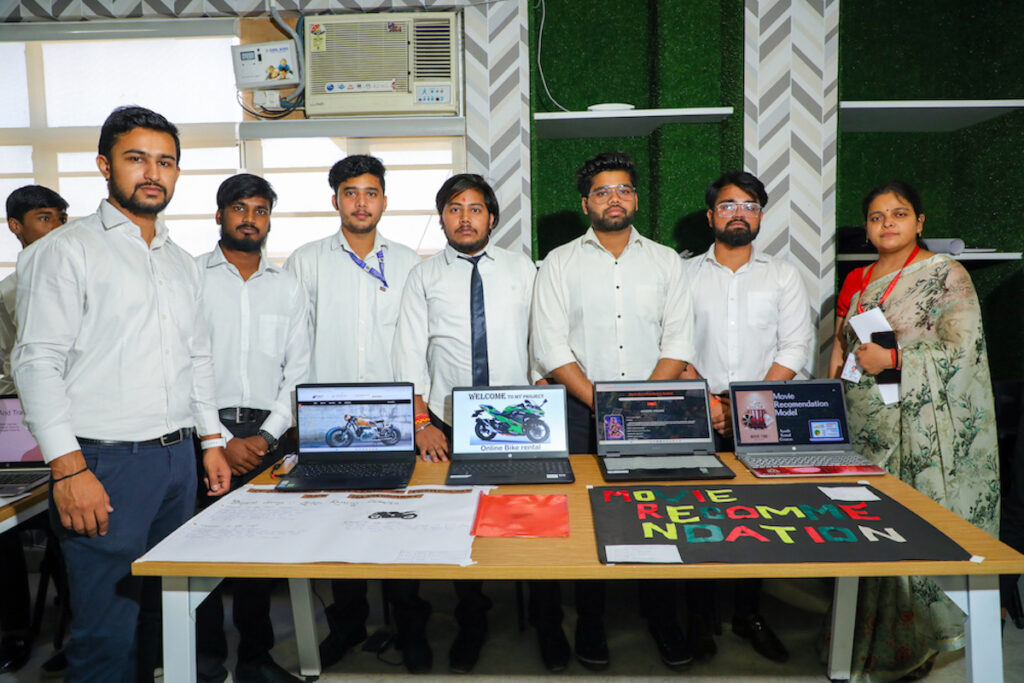
Year 1: Foundation Courses
Semester 1
- Mathematics I: Differential Calculus, Integral Calculus, Matrices, Vector Algebra.
- Physics I: Mechanics, Waves and Oscillations, Optics.
- Chemistry: Chemical Bonding, Thermodynamics, Organic Chemistry, Inorganic Chemistry.
- Introduction to Computing: Basics of Programming, Algorithms, Data Structures.
- Engineering Mechanics: Statics, Dynamics, Work and Energy.
- English for Communication: Grammar, Composition, Communication Skills.
- Environmental Studies: Ecosystems, Biodiversity, Environmental Pollution.
Semester 2
- Mathematics II: Linear Algebra, Differential Equations, Probability and Statistics.
- Physics II: Electromagnetism, Modern Physics, Semiconductor Physics.
- Basic Electrical Engineering: Circuit Theory, Electromagnetism, Power Systems.
- Engineering Drawing: Orthographic Projections, Isometric Projections, CAD.
- Programming in C: Data Types, Control Structures, Functions, Pointers.
- Engineering Chemistry Lab: Practical Experiments based on Chemistry Theory.
- Workshop Practice: Carpentry, Fitting, Welding, Machine Shop.
Year 2: Core Computer Science Courses
Semester 3:
- Discrete Mathematics: Logic, Set Theory, Combinatorics, Graph Theory.
- Data Structures: Arrays, Linked Lists, Stacks, Queues, Trees, Graphs.
- Digital Logic Design: Boolean Algebra, Logic Gates, Combinational and Sequential Circuits.
- Computer Organization and Architecture: CPU, Memory, I/O Systems, ALU.
- Object-Oriented Programming with C++: Classes, Objects, Inheritance, Polymorphism.
- Database Management Systems: SQL, ER Model, Normalization, Transactions.
Semester 4:
- Algorithms: Sorting, Searching, Dynamic Programming, Greedy Algorithms.
- Operating Systems: Process Management, Memory Management, File Systems, Security.
- Computer Networks: OSI Model, TCP/IP, Routing, Switching, Network Security.
- Microprocessors and Microcontrollers: 8085 Microprocessor, Assembly Language, Embedded Systems.
- Software Engineering: SDLC, Agile Methodology, Software Testing, Project Management.
- Theory of Computation: Automata Theory, Formal Languages, Turing Machines.
Year 3: Advanced Topics and Electives
Semester 5:
- Compiler Design: Lexical Analysis, Syntax Analysis, Semantic Analysis, Code Generation.
- Artificial Intelligence: Search Algorithms, Machine Learning, Neural Networks, Expert Systems.
- Web Technologies: HTML, CSS, JavaScript, Server-Side Scripting, Web Frameworks.
- Elective I: Options may include Advanced DBMS, Cloud Computing, Cyber Security, etc.
- Design and Analysis of Algorithms: Advanced Algorithm Design, NP-Completeness, Approximation Algorithms.
- Data Communication: Transmission Media, Data Encoding, Error Detection and Correction.
Semester 6:
- Computer Graphics: Graphics Hardware, 2D/3D Transformations, Rendering, Animation.
- Distributed Systems: Distributed Computing Models, Distributed Databases, Cloud Computing.
- Elective II: Options may include Data Mining, Big Data, Internet of Things (IoT), etc.
- Software Project Management: Project Planning, Risk Management, Quality Assurance, Project Scheduling.
- Mobile Computing: Mobile OS, Mobile App Development, Wireless Communication, Security.
- Operating Systems Lab: Practical Experiments related to OS concepts.
Year 4: Specializations and Major Project
Semester 7:
- Information Security: Cryptography, Network Security, Information Assurance, Ethical Hacking.
- Elective III: Options may include Robotics, Quantum Computing, Natural Language Processing, etc.
- Cloud Computing: Cloud Architecture, Cloud Services, Virtualization, Cloud Security.
- Machine Learning: Supervised Learning, Unsupervised Learning, Reinforcement Learning, Deep Learning.
- Major Project I: Practical project work on a chosen topic related to CSE.
- Industrial Training/Internship: Practical exposure through industry experience.
Semester 8:
- Cyber Security: Threats, Vulnerabilities, Attack Vectors, Incident Response.
- Elective IV: Options may include Advanced AI, Blockchain Technology, Augmented Reality/Virtual Reality, etc.
- Major Project II: Continuation and completion of the major project started in the previous semester.
- Professional Ethics: Ethics in Computing, Professional Responsibility, Legal Issues, Case Studies.
- Seminar: Presentation and discussion on a chosen topic related to recent advancements in CSE.
Electives and Specializations
Elective courses enable students to customize their education according to their interests and career aspirations. Some common elective areas include:
- Data Science and Analytics
- Artificial Intelligence and Machine Learning
- Cybersecurity
- Cloud Computing
- Internet of Things (IoT)
- Robotics
- Blockchain
- Bioinformatics
- Human-Computer Interaction
Labs and Practical Work
Alongside theoretical courses, students engage in practical lab sessions and projects to apply their knowledge. Key labs might include:
- Programming Lab
- Data Structures Lab
- Digital Logic Design Lab
- Microprocessors Lab
- Database Management Systems Lab
- Computer Networks Lab
- Operating Systems Lab
- Software Engineering Lab
- AI and Machine Learning Lab
Importance of Computer Science Engineering Course
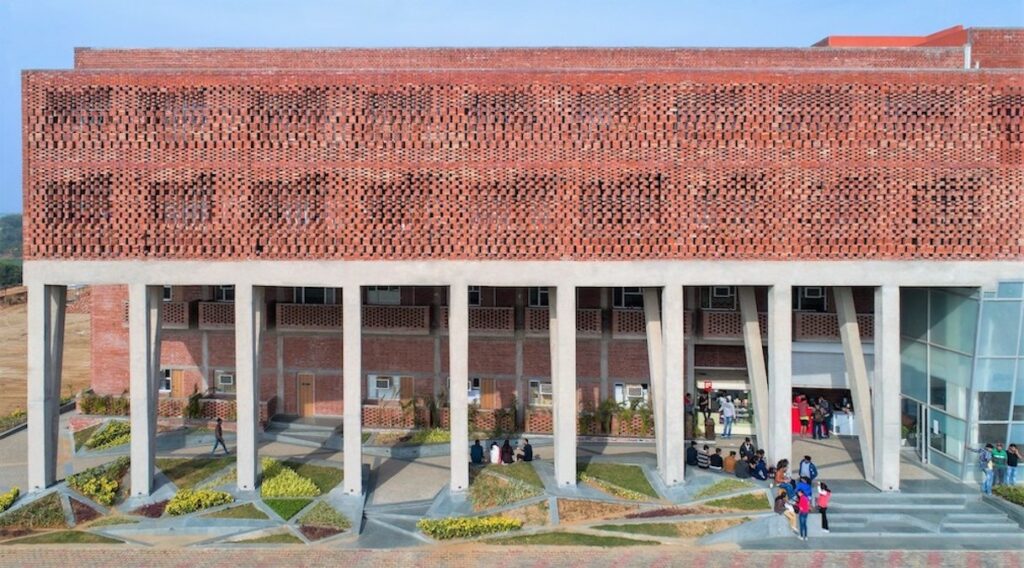
CSE Engineering is a critical and dynamic field that significantly impacts various aspects of modern society and technology. Here are several reasons highlighting the importance of a CSE Engineering course:
1. Foundation of Modern Technology:
- Software Development: CSE forms the backbone of software development, enabling the creation of applications, operating systems, and software tools that drive modern technology.
- Internet and Web Technologies: Knowledge in CSE is essential for developing and maintaining the internet infrastructure, websites, and web applications that connect the world.
2. Innovation and Problem Solving:
- Algorithm Development: CSE promotes logical thinking and problem-solving skills, crucial for developing algorithms that can tackle complex problems efficiently.
- Research and Development: CSE graduates contribute to research and development in areas like artificial intelligence, robotics, quantum computing, and more, pushing the boundaries of what technology can achieve.
3. Economic Impact:
- Tech Industry Growth: The tech industry, heavily reliant on CSE professionals, is a major driver of economic growth, creating millions of jobs and contributing significantly to GDP.
- Startups and Entrepreneurship: CSE knowledge enables the creation of tech startups, fostering innovation and entrepreneurship, leading to new products and services.
4. Career Opportunities:
- High Demand: There is a consistently high demand for CSE graduates across various industries, including software development, finance, healthcare, and more.
- Diverse Roles: CSE graduates can pursue diverse roles such as software engineers, data scientists, cybersecurity analysts, systems architects, and more.
5. Interdisciplinary Applications:
- Healthcare: CSE applications in healthcare include electronic health records, telemedicine, medical imaging, and health informatics, improving patient care and medical research.
- Finance: Fintech, powered by CSE, revolutionizes financial services through online banking, blockchain, algorithmic trading, and risk management.
- Education: CSE contributes to educational technology, creating e-learning platforms, interactive educational tools, and virtual classrooms.
6. Cybersecurity:
- Protecting Data: CSE is essential for developing robust cybersecurity measures to protect sensitive data from breaches and cyberattacks.
- National Security: CSE plays a vital role in national security, ensuring the integrity and security of critical infrastructure and defense systems.
7. Artificial Intelligence and Machine Learning:
- AI Development: CSE is fundamental to the development of AI and machine learning algorithms, which are transforming industries through automation, predictive analytics, and intelligent decision-making.
- Robotics: Advancements in robotics, enabled by CSE, are impacting manufacturing, healthcare, and even daily life with autonomous systems and smart devices.
8. Data Science and Big Data:
- Data Analysis: CSE provides the tools and techniques for analyzing vast amounts of data, leading to insights that drive business decisions, scientific discoveries, and policy-making.
- Big Data: Handling and processing big data is crucial for understanding trends, behaviors, and patterns in various domains such as marketing, urban planning, and climate science.
9. Global Connectivity:
- Networking: CSE ensures the development and maintenance of global communication networks, facilitating instant connectivity and information exchange worldwide.
- Social Media: CSE underpins social media platforms, enabling global interactions, information sharing, and social networking.
10. Sustainability and Environment:
- Smart Technologies: CSE contributes to developing smart technologies for energy management, environmental monitoring, and sustainable urban planning.
- Resource Management: Efficient algorithms and data analysis help in optimizing resource use and reducing environmental impact.
Eligibility Criteria for CSE
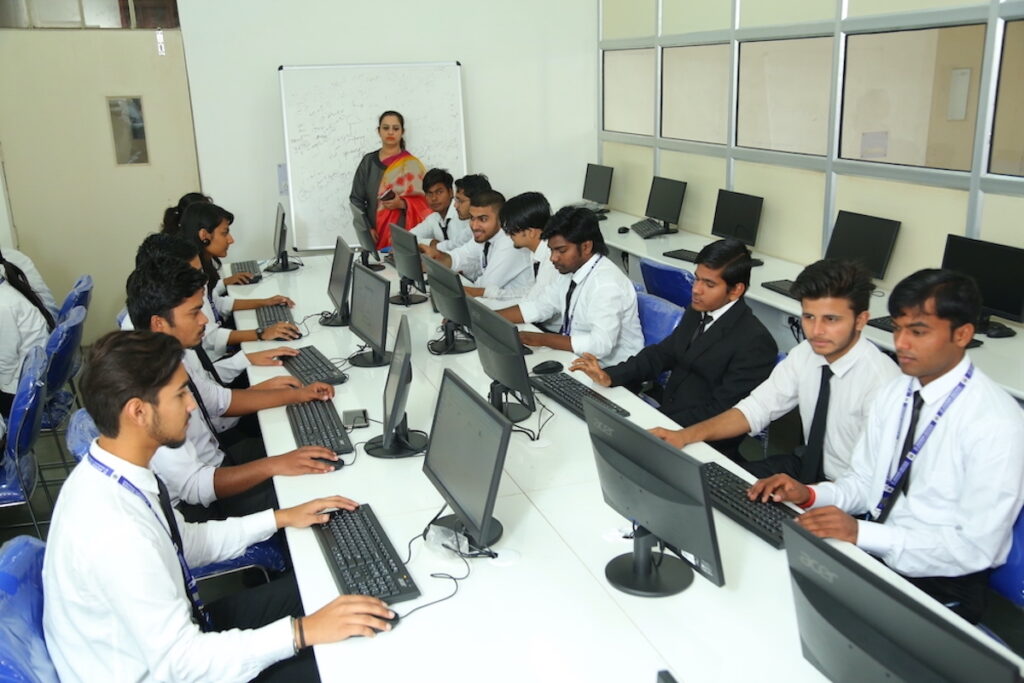
However, the following are common eligibility requirements:
General Criteria
Educational Qualification
- Completion of 10+2 (or equivalent) from a recognized board.
- Mandatory subjects typically include Mathematics, Physics, and Chemistry.
Minimum Marks
- A minimum aggregate score in 10+2 examinations, usually around 50-60% or equivalent grades, although top institutions may require higher marks.
Entrance Exams
- Many institutions require candidates to clear national or state-level entrance exams. Examples include: JEE Main, JEE Advanced, BITSAT, VITEEE, etc.
Age Limit
- Some institutions may have an age limit, often specifying that the candidate should be at least 17 years old at the time of admission.
Language Proficiency
- Proficiency in the language of instruction (e.g., English). For international students, this might mean providing TOEFL, IELTS, or other language proficiency test scores.
Additional Criteria
Extracurricular Activities
Some institutions consider achievements in extracurricular activities, especially those related to science and technology.
Interviews
Personal interviews or group discussions might be part of the selection process.
Portfolio
Some institutions might ask for a portfolio showcasing projects, especially if the course has a practical or project-based component.
Admissions Process for CSE
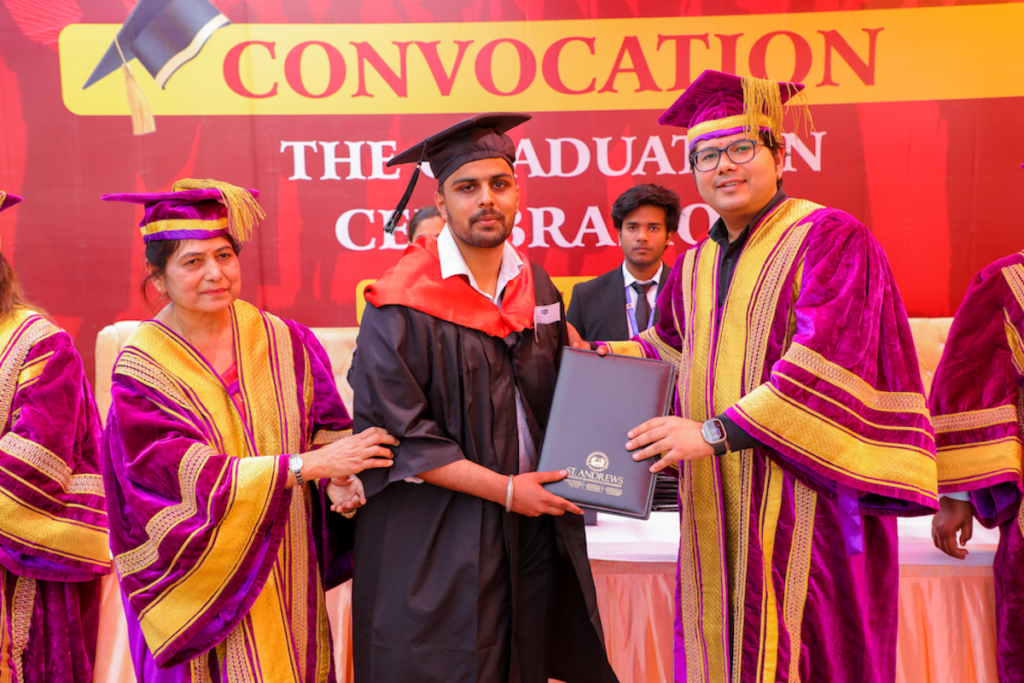
The admissions process for CSE Engineering in India typically follows these general steps:
Entrance Exams
Most engineering colleges and universities, both government and private, require candidates to appear for national or state-level entrance exams. Some of the common entrance exams for CSE include:
- Joint Entrance Examination (JEE) Main: Conducted by the National Testing Agency (NTA) for admission to NITs, IIITs, and other participating institutions.
- JEE Advanced: Conducted for admission to the Indian Institutes of Technology (IITs).
- BITSAT: Conducted by BITS Pilani for admission to its campuses in Pilani, Goa, and Hyderabad.
- State-level engineering entrance exams like MHT CET (Maharashtra), KCET (Karnataka), AP EAMCET (Andhra Pradesh), etc.
Application Process
Candidates need to fill out the application forms for the entrance exams they wish to appear for. This usually involves providing personal details, educational qualifications, and selecting the preferred exam centers.
Admit Card
Admit cards or hall tickets are issued to candidates once they successfully complete the application process. The admit card contains details such as exam date, time, and center.
Entrance Exam
Candidates appear for the entrance exam on the specified date and time. The exam typically tests candidates on subjects like Physics, Chemistry, Mathematics, and sometimes Aptitude and Logical Reasoning.
Results and Counseling
After the exams, results are declared, and candidates are ranked based on their performance. Counseling sessions are then conducted where candidates choose their preferred colleges and courses based on their ranks and availability of seats.
Seat Allotment
Based on the counseling process and ranks secured, seats are allotted to candidates in various colleges. Some institutions may have additional rounds of counseling or spot admissions for vacant seats.
Document Verification and Admission
Finally, candidates need to verify their documents (educational certificates, identity proof, etc.) at the allotted college and complete the admission formalities, including payment of fees.
Scope of Computer Science Engineering Course
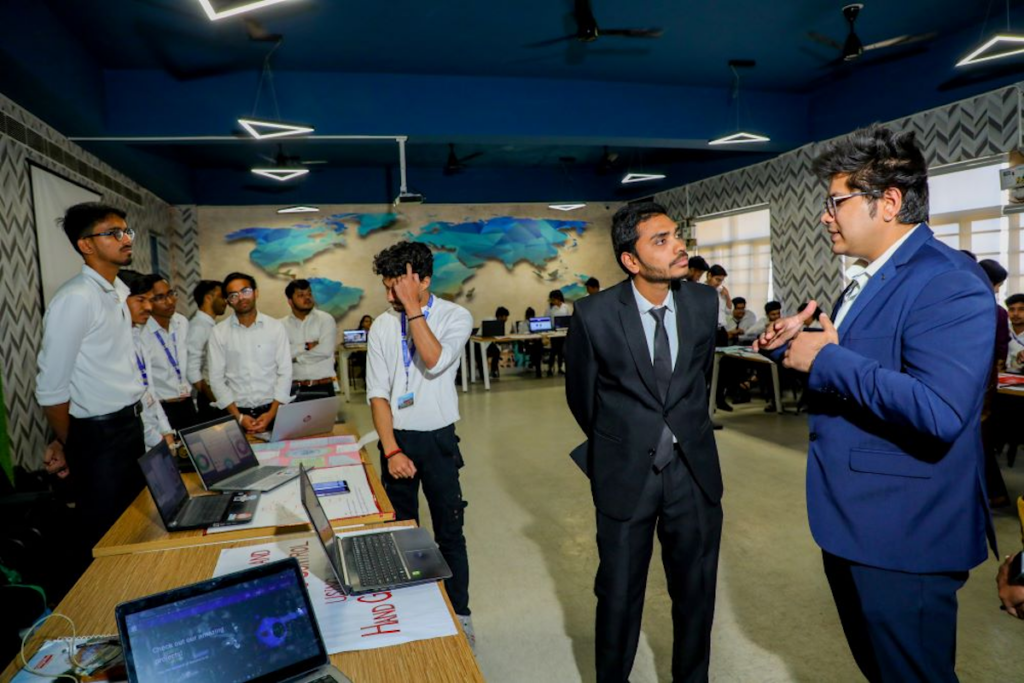
Here are some key aspects that highlight the scope of CSE:
High Demand
CSE Engineering graduates are in high demand globally across sectors such as IT services, software engineering, finance, healthcare, telecommunications, and more. Virtually every industry relies on technology, creating a continuous demand for skilled CSE Engineering professionals.
Diverse Career Opportunities
Graduates can pursue various career paths as software developers, systems analysts, data scientists, cybersecurity specialists, network engineers, AI/machine learning engineers, and more. Specializations in areas like blockchain, IoT, cloud technology, and AR/VR further enhance career prospects.
Innovation and Research
CSE encourages innovation and research, leading to advancements in fields such as AI, quantum processing, cybersecurity, and big data analytics. Professionals contribute to groundbreaking technologies that shape the future.
Entrepreneurship
Many CSE graduates venture into entrepreneurship, creating startups and tech companies that develop innovative products and solutions. The entrepreneurial spirit is fostered through knowledge of technology trends, market needs, and business acumen.
Global Opportunities
With technology being a global field, CSE professionals have opportunities to work internationally, collaborate on global projects, and contribute to multinational organizations.
Continuous Learning
Technology evolves rapidly, requiring CSE professionals to engage in lifelong learning to stay updated with emerging trends, tools, and methodologies. Continuing education and certifications further enhance career progression.
Impact Across Sectors
CSE professionals play a crucial role in transforming industries through automation, digitalization, data-driven decision-making, enhanced user experiences, and technological solutions to complex challenges.
Top Entrance Exams for CSE
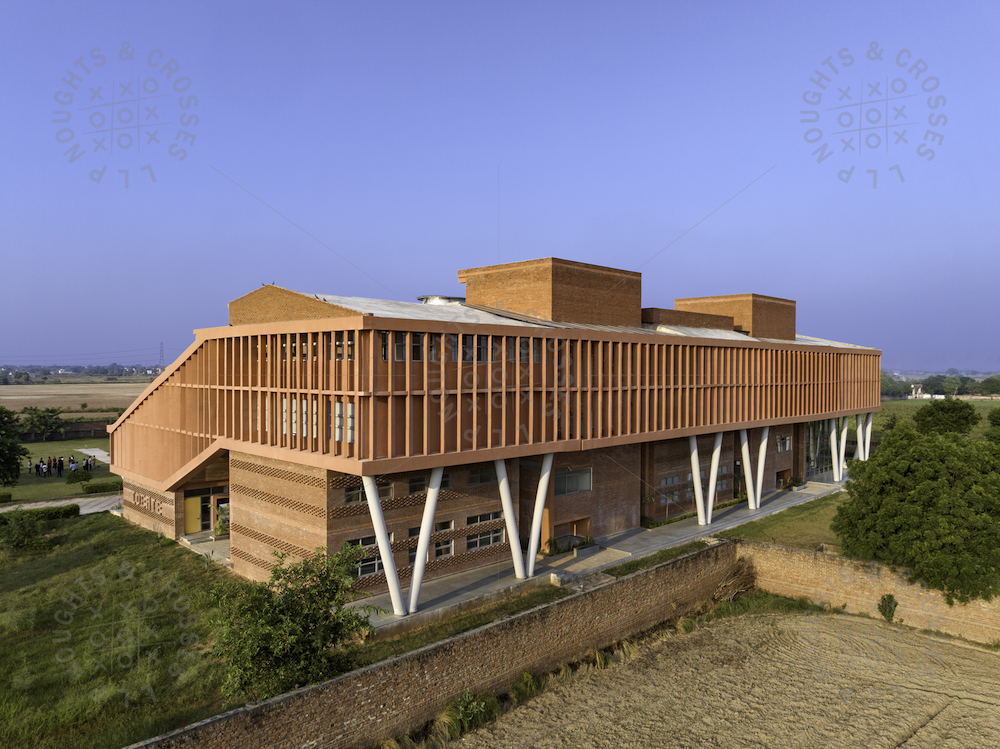
Here are the top entrance exams:
Joint Entrance Examination (JEE) Main
- Conducted By: National Testing Agency (NTA)
- Purpose: Admission to National Institutes of Technology (NITs), Indian Institutes of Information Technology (IIITs), and other centrally funded technical institutions.
- Frequency: Twice a year (January and April)
- Format: Multiple-choice questions covering Physics, Chemistry, and Mathematics.
Joint Entrance Examination (JEE) Advanced
- Conducted By: One of the IITs on a rotational basis
- Purpose: Admission to Indian Institutes of Technology (IITs)
- Eligibility: Top candidates from JEE Main
- Format: Multiple-choice questions and numerical answer type questions covering advanced topics in Physics, Chemistry, and Mathematics.
Birla Institute of Technology and Science Admission Test (BITSAT)
- Conducted By: BITS Pilani
- Purpose: Admission to BITS Pilani, BITS Goa, and BITS Hyderabad
- Frequency: Once a year
- Format: Multiple-choice questions covering Physics, Chemistry, Mathematics/Biology, English Proficiency, and Logical Reasoning.
VIT Engineering Entrance Examination (VITEEE)
- Conducted By: VIT University
- Purpose: Admission to VIT Vellore and VIT Chennai
- Frequency: Once a year
- Format: Multiple-choice questions covering Physics, Chemistry, Mathematics/Biology, and English.
Amrita Engineering Entrance Examination (AEEE)
- Conducted By: Amrita Vishwa Vidyapeetham
- Purpose: Admission to Amrita Schools of Engineering
- Frequency: Once a year
- Format: Multiple-choice questions covering Physics, Chemistry, and Mathematics.
Karnataka Common Entrance Test (KCET)
- Conducted By: Karnataka Examinations Authority (KEA)
- Purpose: Admission to engineering colleges in Karnataka
- Frequency: Once a year
- Format: Multiple-choice questions covering Physics, Chemistry, Mathematics/Biology.
COMEDK Under Graduate Entrance Test (COMEDK UGET)
- Conducted By: Consortium of Medical, Engineering and Dental Colleges of Karnataka
- Purpose: Admission to engineering colleges in Karnataka
- Frequency: Once a year
- Format: Multiple-choice questions covering Physics, Chemistry, and Mathematics.
West Bengal Joint Entrance Examination (WBJEE)
- Conducted By: West Bengal Joint Entrance Examinations Board
- Purpose: Admission to engineering colleges in West Bengal
- Frequency: Once a year
- Format: Multiple-choice questions covering Physics, Chemistry, and Mathematics.
Top Government Colleges for CSE in India

Here are some of the top government colleges in India known for their Computer Science Engineering (CSE) programs:
Anna University, College of Engineering Guindy
- Location: Chennai, Tamil Nadu
- Highlights: Known for its strong emphasis on research and development, extensive industry collaborations, and modern infrastructure including advanced laboratories.
Delhi Technological University (DTU)
- Location: Delhi
- Highlights: Formerly known as Delhi College of Engineering, DTU is renowned for its academic excellence, vibrant campus life, and high placement rates in leading tech companies.
St. Andrews Institute of Technology and Management (SAITM), Gurgaon
- Location: Haryana
- Highlights: SAITM offers a strong CSE program with a rich academic heritage, advanced laboratories, and a robust placement track record.
Jadavpur University, Faculty of Engineering & Technology
- Location: Kolkata, West Bengal
- Highlights: Known for its legacy of academic excellence, research contributions, and strong industry partnerships. It offers a conducive environment for innovation and entrepreneurship.
PEC University of Technology (Punjab Engineering College)
- Location: Chandigarh, Punjab
- Highlights: Renowned for its rigorous academic programs, focus on practical learning through industry projects, and a strong alumni network in the field of engineering.
Motilal Nehru National Institute of Technology (MNNIT)
- Location: Allahabad (Prayagraj), Uttar Pradesh
- Highlights: Offers a conducive environment for learning with a focus on research, innovation, and industry collaborations. Known for its quality education in engineering disciplines.
Top Private Computer Science Engineering Colleges in India

Here are some of the top private Engineering colleges in India known for their Computer Science Engineering (CSE) programs:
Birla Institute of Technology and Science (BITS) Pilani
- Location: Pilani, Rajasthan (with campuses in Goa, Hyderabad, and Dubai)
- Highlights: Renowned for its strong emphasis on research, innovative teaching methods, and global collaborations. It offers excellent placement opportunities in leading tech firms.
International Institute of Information Technology (IIIT) Hyderabad
- Location: Hyderabad, Telangana
- Highlights: Known for its specialized programs in CSE, focus on entrepreneurship, research-driven curriculum, and high-quality faculty. It has a strong reputation in the tech industry.
St. Andrews Institute of Technology and Management [SAITM], Gurgaon
- Location: Haryana
- Highlights: SAITM offers a strong B.Tech CSE program with a rich academic heritage, advanced laboratories, and a robust placement track record.
Vellore Institute of Technology (VIT)
- Location: Vellore, Tamil Nadu (with campuses in Chennai, Bhopal, and Amaravati)
- Highlights: Offers a comprehensive curriculum in CSE, modern infrastructure, industry collaborations, and a strong track record in placements. It emphasizes hands-on learning and innovation.
Fees Structure for CSE Course
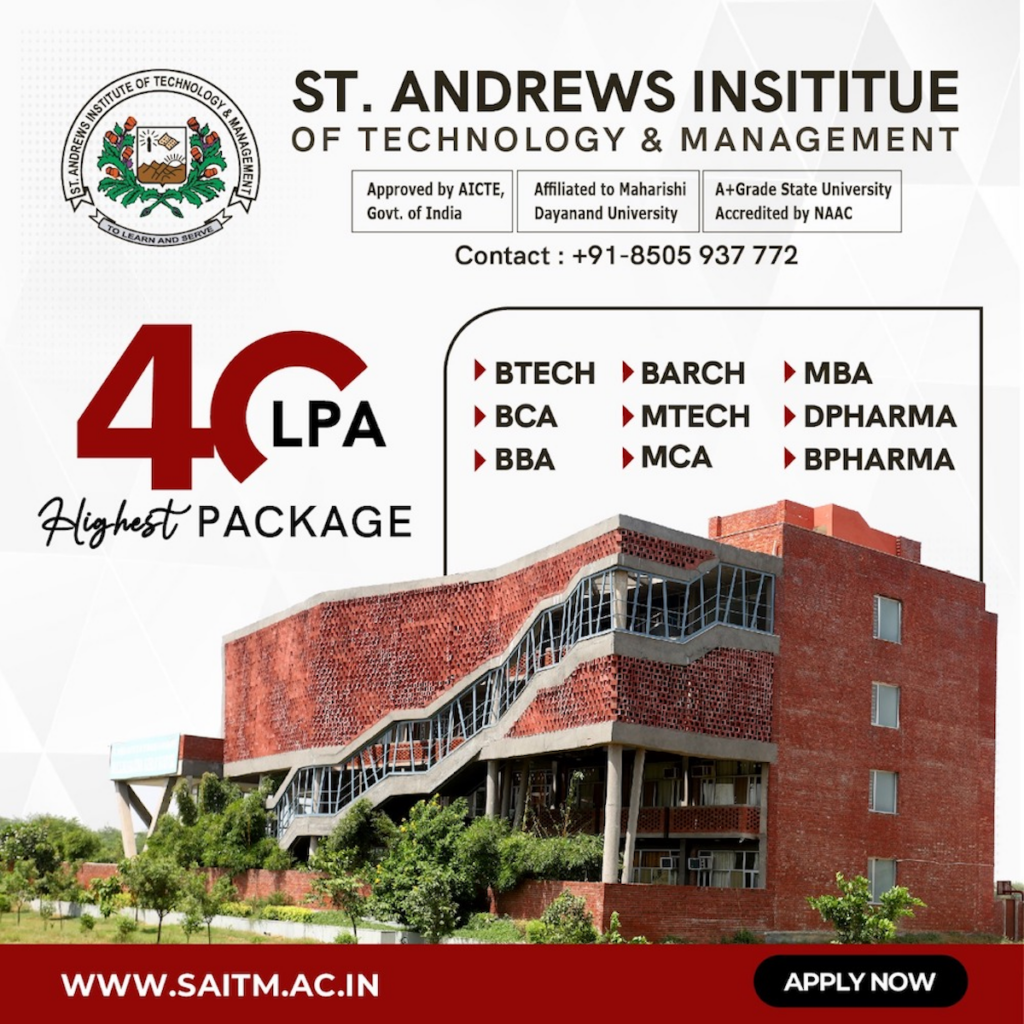
Here’s a general overview:
Government/Public Institutions
Typically have lower tuition fees compared to private colleges. For undergraduate (B.Tech) courses in CSE, fees can range from approximately ₹20,000 to ₹1,00,000 per year, varying based on the state and the specific college.
Private Institutions
Tend to have higher fees. For undergraduate CSE courses in private colleges, fees can range widely, starting from around ₹50,000 per year to several lakhs per year. Some prestigious private institutions may charge even higher fees.
NRI/Management Quota
In some private institutions, seats under NRI or management quota may have significantly higher fees compared to regular seats.
Additional Costs
Apart from tuition fees, students may incur additional costs for hostel accommodation, food, books, and other miscellaneous expenses.
Career Opportunities in Computer Science Engineering
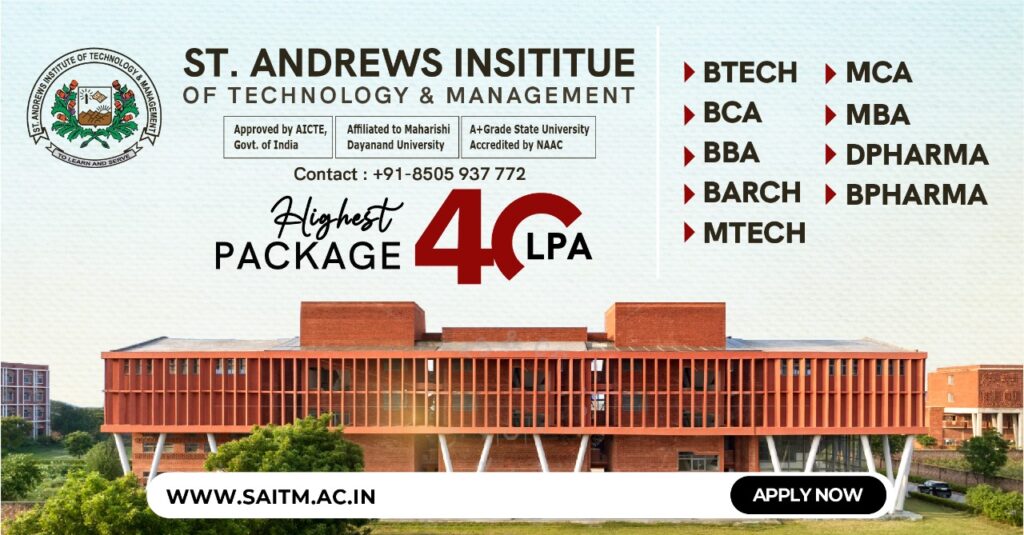
Here are some key career paths that computer science graduates can pursue:
Software Developer-Engineer
Designing, developing, and testing software applications and systems. Specializations may include frontend development, backend development, full-stack development, and more.
Web Developer:
Building and maintaining websites and web applications using programming languages like HTML, CSS, JavaScript, and frameworks such as React, Angular, or Node.js.
Database Administrator:
Managing and maintaining databases to ensure data integrity, security, and performance. Skills in SQL, database design, and administration are essential.
Systems Analyst:
Analyzing and improving computer systems and processes within an organization to enhance efficiency and productivity. This role involves understanding business needs and translating them into technical requirements.
Network Engineer
Designing, implementing, and managing data networks, including LANs, WANs, and wireless networks. Network engineers ensure reliable connectivity and optimal performance.
Data Scientist
Using statistical techniques and machine learning algorithms to analyze large datasets and derive actionable insights. Data scientists are in demand across industries for their expertise in data analysis and predictive modeling.
Cybersecurity Analyst:
Protecting computer systems, networks, and data from cyber threats and attacks. Cybersecurity analysts use tools and techniques to identify vulnerabilities and implement security measures.
Machine Learning Engineer
Building and deploying machine learning models and algorithms to automate decision-making processes and improve system performance. This role requires expertise in data science and programming.
Cloud Engineer
Designing, deploying, and managing cloud infrastructure and services, such as AWS, Azure, or Google Cloud Platform. Cloud engineers ensure scalability, reliability, and security of cloud-based applications and systems.
AI Engineer
Developing artificial intelligence systems and applications, including natural language processing, computer vision, and robotics. AI engineers work on cutting-edge technologies to create intelligent solutions.
IT Consultant
Advising businesses on technology strategies, IT infrastructure, and digital transformation. IT consultants help organizations leverage technology to achieve their business goals and improve operational efficiency.
Game Developer
Designing and programming video games for various platforms, including consoles, PCs, and mobile devices. Game developers collaborate with artists, designers, and engineers to create interactive and engaging games.
Job Profiles After CSE
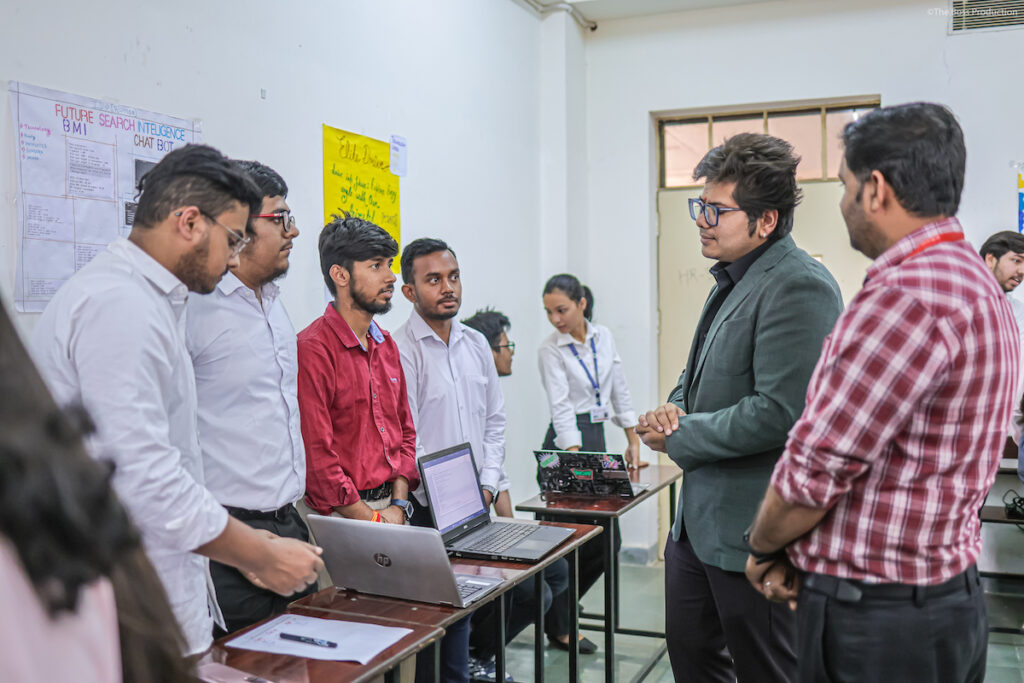
Here are some common job profiles:
Software Developer Engineer
Designing, developing, and testing software applications and systems.
Web Developer
Building websites and web applications, often specializing in frontend or backend development.
Database Administrator
Managing and maintaining databases, ensuring data security and efficiency.
Systems Analyst
Analyzing an organization’s computer systems and procedures to help them operate more efficiently.
Network Engineer:
Designing, implementing, and managing data networks within an organization.
Machine Learning Engineer/Data Scientist
Applying machine learning algorithms and data analysis techniques to extract insights from data.
Cybersecurity Analyst
Protecting computer systems and networks from cyber threats and attacks.
Game Developer:
Designing and programming video games for various platforms.
Cloud Engineer:
Managing cloud infrastructure and services, including deployment, maintenance, and security.
IT Consultant:
Advising businesses on how to use technology to meet their goals and solve problems.
Top Recruiters for CSE Graduates
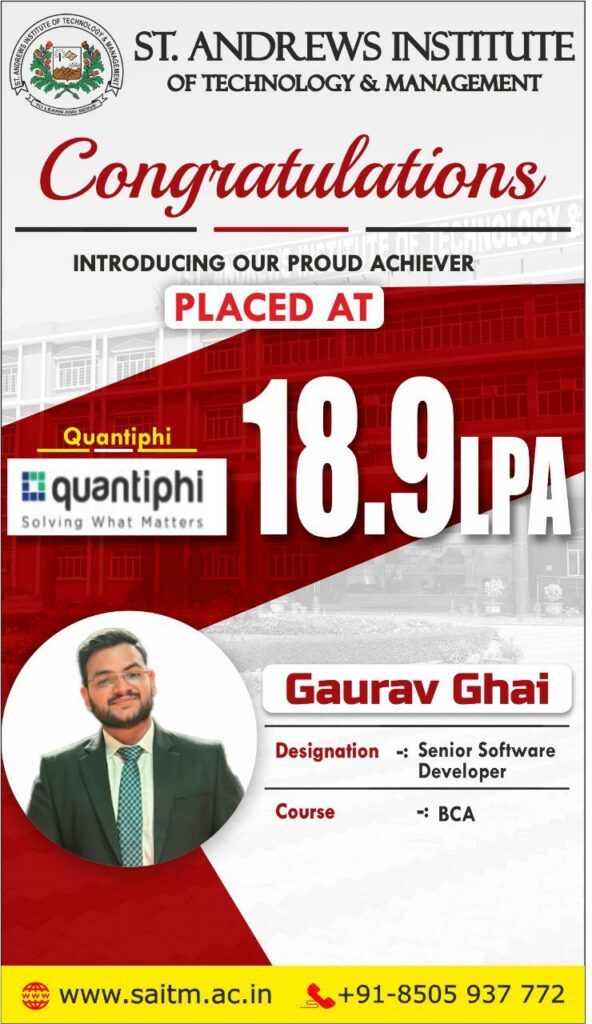
Some of the top recruiters for CSE graduates in India include:
IT Services and Consulting Companies
- TCS (Tata Consultancy Services)
- Infosys
- Wipro
- Cognizant
- Accenture
- Capgemini
- HCL Technologies
- Tech Mahindra
- IBM India
- Deloitte
Product-Based Technology Companies
- Microsoft
- Amazon
- Adobe
- Cisco
- Oracle
- Intel
- NVIDIA
- Salesforce
- VMware
Startups and E-commerce Platforms
- Flipkart
- Paytm
- Ola
- Swiggy
- Zomato
- Snapdeal
- MakeMyTrip
- Byju’s
- Policy bazaar
Financial Services and Banks
- Goldman Sachs
- JP Morgan
- Morgan Stanley
- Citibank
- HSBC
- Axis Bank
- ICICI Bank
- HDFC Bank
Telecommunications
- Reliance Jio
- Bharti Airtel
- Vodafone Idea
- Ericsson
- Nokia
Salary for CSE Graduates
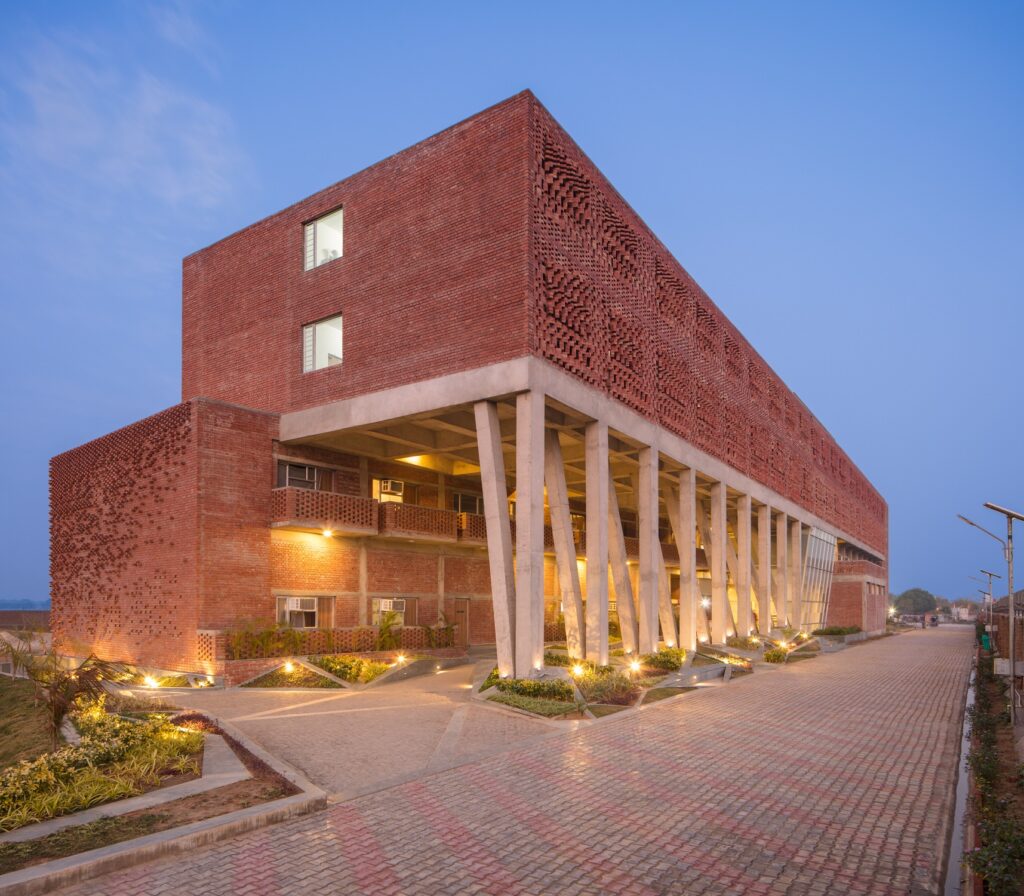
Here is a detailed breakdown:
Entry-Level Salaries (0-2 years of experience)
Average Salary Range:
- ₹3,00,000 to ₹8,00,000 per annum
Top Institutions (IITs, NITs, BITS Pilani, etc.)
- ₹8,00,000 to ₹20,00,000 per annum
Service-Based Companies (e.g., TCS, Infosys, Wipro)
- ₹3,50,000 to ₹6,00,000 per annum
Product-Based Companies (e.g., Google, Microsoft, Amazon)
- ₹10,00,000 to ₹20,00,000 per annum
Mid-Level Salaries (3-5 years of experience)
Average Salary Range
- ₹8,00,000 to ₹20,00,000 per annum
Top Product-Based Companies
- ₹15,00,000 to ₹30,00,000 per annum
Service-Based Companies
- ₹6,00,000 to ₹12,00,000 per annum
Senior-Level Salaries (5-10 years of experience)
Average Salary Range
- ₹15,00,000 to ₹40,00,000 per annum
Top Product-Based Companies
- ₹25,00,000 to ₹50,00,000+ per annum
Service-Based Companies
- ₹12,00,000 to ₹25,00,000 per annum
Factors Influencing Salary
Institution Reputation
- Graduates from top-tier institutions (IITs, NITs, BITS Pilani) often receive higher starting salaries.
Industry
- Industries like technology, finance, e-commerce, and consulting tend to offer higher salaries.
Location
- Salaries in metropolitan cities (Bangalore, Mumbai, Delhi NCR, Hyderabad) are generally higher due to the cost of living and demand for tech talent.
Skills and Specialization
- Expertise in high-demand areas such as artificial intelligence, data science, cybersecurity, cloud technology, and full-stack development can command higher salaries.
Company Size and Reputation
- Large multinational companies and high-growth startups often offer competitive salaries and benefits.
Experience and Role
- More experience and higher-level roles (e.g., senior developer, tech lead, project manager) result in higher compensation.
Specializations in Computer Science Engineering
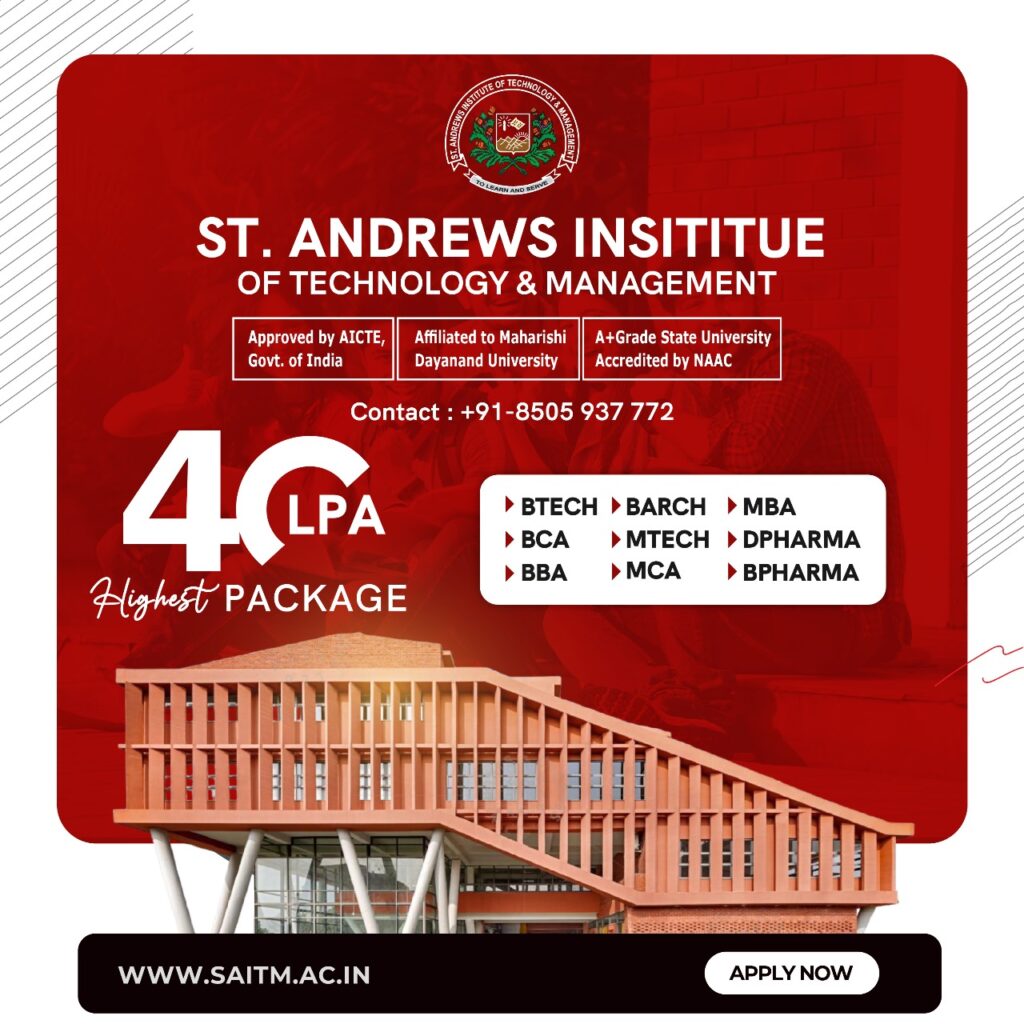
Here are some of the prominent specializations within CSE:
Artificial Intelligence and Machine Learning
- Topics Covered: Neural Networks, Deep Learning, Natural Language Processing, Computer Vision, Reinforcement Learning, Data Mining.
- Career Paths: AI Engineer, Machine Learning Engineer, Data Scientist, Research Scientist.
Data Science and Big Data Analytics
- Topics Covered: Data Mining, Statistical Analysis, Data Visualization, Big Data Technologies (Hadoop, Spark), Predictive Analytics.
- Career Paths: Data Scientist, Data Analyst, Big Data Engineer, Business Intelligence Analyst.
Cyber security
- Topics Covered: Network Security, Cryptography, Ethical Hacking, Information Security Management, Cyber Threat Intelligence.
- Career Paths: Security Analyst, Ethical Hacker, Cybersecurity Consultant, Information Security Manager.
Cloud Computing:
- Topics Covered: Cloud Architecture, Cloud Services (AWS, Azure, Google Cloud), Virtualization, Cloud Security, DevOps.
- Career Paths: Cloud Engineer, Cloud Architect, DevOps Engineer, Cloud Security Specialist.
Internet of Things (IoT)
- Topics Covered: IoT Architecture, Sensors and Actuators, IoT Protocols, Embedded Systems, IoT Security.
- Career Paths: IoT Developer, Embedded Systems Engineer, IoT Architect, IoT Security Specialist.
Robotics
- Topics Covered: Robotics Programming, Control Systems, Sensor Integration, Autonomous Robots, Human-Robot Interaction.
- Career Paths: Robotics Engineer, Automation Engineer, Research Scientist in Robotics, Control Systems Engineer.
Blockchain Technology:
- Topics Covered: Blockchain Fundamentals, Cryptocurrencies, Smart Contracts, Decentralized Applications (DApps), Blockchain Security.
- Career Paths: Blockchain Developer, Blockchain Architect, Cryptocurrency Analyst, Smart Contract Developer.
Software Engineering
- Topics Covered: Software Engineering Life Cycle (SDLC), Agile Methodologies, Software Testing, DevOps, Software Design Patterns.
- Career Paths: Software Engineer, DevOps Engineer, Quality Assurance Engineer, Project Manager.
Human-Computer Interaction (HCI)
- Topics Covered: User Experience (UX) Design, Usability Testing, Interaction Design, User Interface (UI) Design, Cognitive Psychology.
- Career Paths: UX Designer, UI Designer, HCI Researcher, Usability Analyst.
Upcoming Trends in Computer Science Engineering

Some of the upcoming trends in CSE include:
Artificial Intelligence (AI) and Machine Learning (ML)
- AI and ML continue to dominate as key trends in CSE, with applications in areas such as natural language processing, computer vision, autonomous systems, and predictive analytics.
Data Science and Big Data
- The increasing volume and complexity of data are driving the demand for data scientists and engineers who can manage, analyze, and derive insights from large datasets using advanced algorithms and tools.
Blockchain Technology
- Beyond cryptocurrencies, blockchain technology is being explored for applications in secure transactions, supply chain management, decentralized finance (DeFi), and smart contracts.
Cyber security:
- With the rise in cyber threats and data breaches, cybersecurity remains critical. There is a growing focus on developing robust security solutions, including encryption techniques, threat detection systems, and ethical hacking practices.
Internet of Things [IoT]
- IoT continues to connect devices and systems, enabling smart environments in homes, industries, healthcare, and agriculture. CSE professionals are needed to develop IoT platforms, protocols, and security measures.
Cloud Computing;
- Cloud computing offers scalable and flexible solutions for storage, computing power, and software services. Trends include serverless computing, edge computing, and multi-cloud strategies.
Quantum Computing
- Quantum computing has the potential to solve complex problems that are beyond the capabilities of classical computers. Research and development are focused on building quantum algorithms, qubit technologies, and quantum-resistant cryptography.
Augmented Reality (AR) and Virtual Reality (VR)
- AR and VR are transforming user experiences in gaming, education, healthcare, and training. CSE professionals are involved in developing immersive environments, 3D modeling, and interaction design.
Software Development Practices
- Agile methodologies, DevOps practices, and continuous integration/continuous deployment (CI/CD) pipelines are becoming standard in software development to improve efficiency, collaboration, and product delivery.
Ethical AI and Responsible Technology
- There is a growing emphasis on ethical considerations in AI development, including fairness, transparency, accountability, and bias mitigation. CSE professionals are expected to integrate ethical principles into their technological innovations.
Required Skillset for Computer Science Engineering
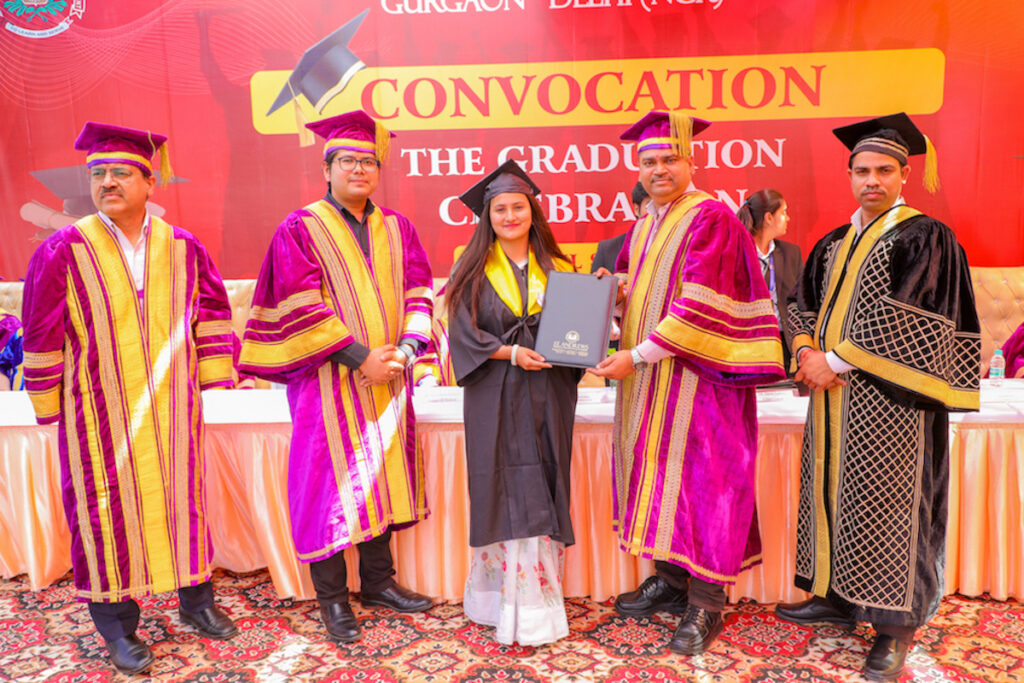
Here are some essential skills required for a successful career in CSE:
Technical Skills
Programming Languages
Proficiency in programming languages is crucial. Key languages include:
- Core Languages: Java, Python, C/C++, JavaScript
- Web Development: HTML, CSS, JavaScript, frameworks like React, Angular, Node.js
- Database: SQL, NoSQL databases like MongoDB
Data Structures and Algorithms
Understanding fundamental data structures (arrays, linked lists, trees, graphs) and algorithms (sorting, searching, dynamic programming) is essential for problem-solving and application development.
Software Development
Knowledge of software development lifecycle (SDLC), version management systems (e.g., Git), debugging, and testing methodologies (unit testing, integration testing).
Operating Systems
Understanding of operating system concepts such as processes, memory management, file systems, and concurrency.
Computer Networks
Familiarity with network protocols (TCP/IP, HTTP, DNS), network security, routing algorithms, and basics of network administration.
Database Management
Skills in designing, querying, and managing databases using SQL and familiarity with database systems like MySQL, PostgreSQL, Oracle.
Web Technologies:
Knowledge of web development frameworks, RESTful APIs, server-side scripting, and web security principles.
Data Science and Machine Learning
Basics of data analysis, statistical modeling, machine learning algorithms, and tools like TensorFlow, Scikit-learn, or PyTorch.
CloudComputing
Understanding cloud platforms (AWS, Azure, Google Cloud), services (IaaS, PaaS, SaaS), and deployment models (public, private, hybrid).
Cybersecurity;
Awareness of cybersecurity principles, secure coding practices, encryption techniques, and methods to protect against cyber threats.
Soft Skills:
Problem-Solving
Ability to analyze problems, think critically, and devise effective solutions using logical reasoning and creativity.
Communication Skills
Clear and concise communication, both verbal and written, to collaborate effectively with team members, stakeholders, and clients.
Teamwork and Collaboration
Ability to work collaboratively in multidisciplinary teams, share ideas, and contribute to collective goals.
Time Management
Efficiently managing time and priorities to meet deadlines and deliver projects on schedule.
Adaptability
Flexibility to learn new technologies, adapt to changing environments, and embrace continuous learning.
Attention to Detail
Ensuring accuracy and thoroughness in coding, testing, and documentation to deliver high-quality software solutions.
Ethical and Professional Responsibility
Understanding ethical implications of technology, respecting privacy, and adhering to professional standards and codes of conduct.
Top Reasons to Choose Computer Science Engineering
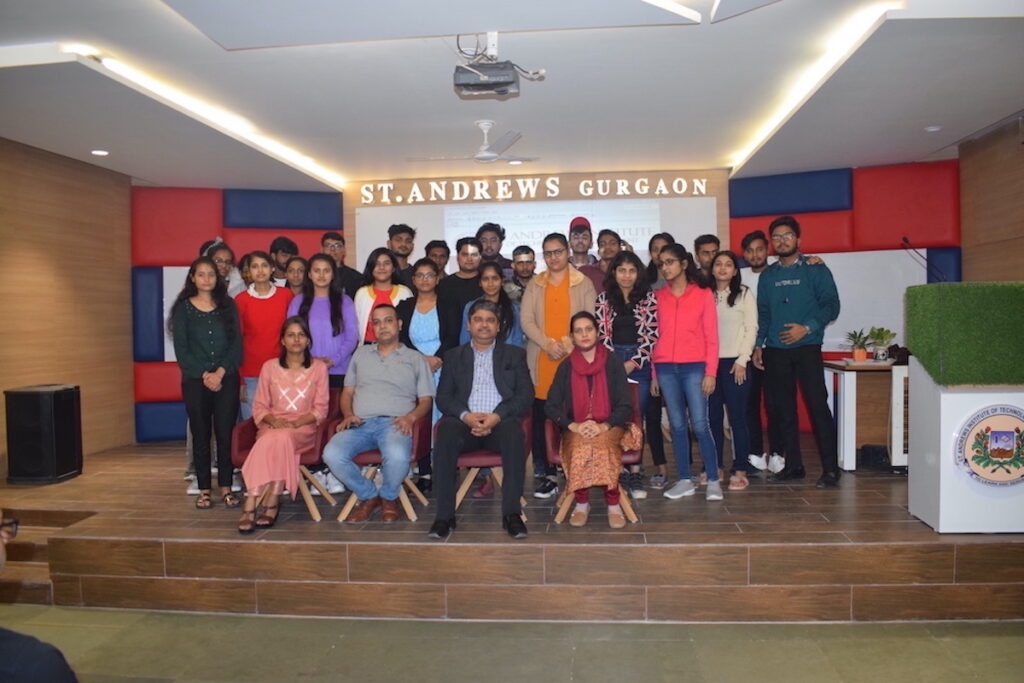
Here are the top reasons to consider pursuing CSE:
Vast Career Opportunities
CSE graduates enjoy diverse career paths across industries such as IT services, application development, finance, healthcare, telecommunications, and more. The demand for skilled CSE professionals continues to grow globally.
High Salary Potential
CSE professionals typically command competitive salaries due to their specialized skills and high demand in the job market. Salaries often surpass those in many other fields.
Continuous Innovation
CSE is at the forefront of technological innovation, driving advancements in artificial intelligence, machine learning, cybersecurity, cloud computing, and more. It offers opportunities to work on cutting-edge technologies and shape the future.
Global Relevance
Technology transcends borders, offering CSE professionals opportunities to work internationally, collaborate on global projects, and contribute to multinational companies and organizations.
Job Security
With technology becoming increasingly integral to business operations and daily life, CSE professionals enjoy strong job security and stability, even during economic fluctuations.
Flexibility and Specialization
offers flexibility to specialize in areas of interest such as software development, data science, cybersecurity, network engineering, AI/ML, and more. This allows individuals to tailor their career paths according to their passions and career goals.
Entrepreneurial Opportunities
CSE equips graduates with skills to innovate and create new technologies, fostering entrepreneurship. Many successful startups are founded by CSE professionals who develop innovative solutions to meet market needs.
Continuous Learning and Growth
Technology evolves rapidly, requiring CSE professionals to engage in continuous learning to stay updated with emerging trends, tools, and methodologies. This ensures ongoing professional growth and development.
Impactful Contributions
CSE professionals have the opportunity to make meaningful contributions to society by improving healthcare systems, enhancing education through technology, advancing environmental sustainability efforts, and more.
Prestige and Recognition
CSE is widely recognized as a prestigious field due to its critical role in shaping the modern world. It offers opportunities for recognition and respect for expertise in cutting-edge technologies.
Industry Demand for Computer Science Engineering Course

The demand for graduates with a Computer Science Engineering (CSE) course background is consistently high across various industries for several reasons:
Digital Transformation
Businesses are increasingly adopting digital technologies to streamline operations, enhance efficiency, and innovate their products and services. CSE professionals play a key role in developing and implementing these digital solutions.
Software Development
There is a continuous demand for skilled software developers who can design, code, and maintain applications across platforms and devices, meeting the growing needs of businesses and consumers.
Data Analytics and AI
With the explosion of data, organizations are focusing on data-driven decision-making. CSE graduates proficient in data analytics, AI, and machine learning are in high demand to extract insights and drive business strategies.
Cybersecurity:
As cyber threats become more sophisticated, the need for cybersecurity professionals who can protect sensitive information and secure networks is critical across industries.
Cloud Computing(CC)
The shift towards cloud-based solutions requires expertise in designing, deploying, and managing scalable and secure cloud infrastructure, driving demand for CSE graduates with cloud computing skills.
IoT and Connectivity
The Internet of Things (IoT) is revolutionizing industries by connecting devices and enabling data exchange. CSE professionals are needed to develop and manage IoT solutions, ensuring efficient and secure operations.
E-commerce and Digital Marketing
The growth of online commerce and digital platforms requires CSE expertise in developing e-commerce websites, optimizing user experiences, and managing digital marketing campaigns.
Healthcare and Telemedicine
Technology is transforming healthcare delivery through telemedicine, electronic health records, and medical imaging technologies, creating opportunities for CSE professionals to innovate in healthcare IT solutions.
Automotive and Robotics
Industries like automotive and manufacturing are increasingly integrating robotics and automation technologies, relying on CSE graduates to develop and optimize these advanced systems.
Startups and Entrepreneurship
CSE graduates are well-positioned to start their own tech ventures, leveraging their skills in innovation, software development, and emerging technologies to address market needs and disrupt industries.
Scholarships and Financial Aid for CSE students

Here are some common sources of scholarships and financial aid available to CSE students:
Government Scholarships and Grants
National Scholarship Portal (NSP):
Many governments, including India, offer scholarships through NSP for meritorious students based on academic performance and financial need.
State Government Scholarships:
Various states in India provide scholarships to students pursuing higher education, including CSE, based on state-specific eligibility criteria.
Institution-Specific Scholarships
Merit-Based Scholarships:
Offered by universities and colleges to students with outstanding academic records in CSE.
Need-Based Scholarships:
Financial aid based on the student’s financial situation, often requiring submission of income-related documents.
Corporate and Private Scholarships
Tech Companies:
Many tech giants and IT companies offer scholarships to support students pursuing CSE degrees. Examples include scholarships from Google, Microsoft, IBM, and others.
Private Foundations and Trusts:
Non-profit organizations and foundations offer scholarships to support education in STEM fields, including computer science.
Other Financial Aid Options
Student Loans:
Banks and financial institutions provide education loans at preferential interest rates for higher studies, including CSE programs.
Work-Study Programs:
Some universities offer work-study opportunities where students can work part-time on campus to offset tuition costs.
How to Find Scholarships
University Websites
Check the official websites of universities and colleges for information on scholarships, eligibility criteria, and application procedures.
Scholarship Portals
Websites like Scholarship.com, Fastweb, and Scholarships.com provide databases of scholarships available based on various criteria.
Government Websites
Visit government scholarship portals or education department websites for information on national and state-level scholarships.
Corporate Websites
Check the websites of tech companies and corporations for details on scholarship programs they offer for CSE students.
Networking
Connect with professors, career counselors, and alumni networks who may have information on scholarships and financial aid opportunities.
FAQs
What is in CSE engineering?
Computer Science Engineering (CSE) focuses on the design, development, and maintenance of computer systems and software. It combines principles from computer science and electrical engineering. Key areas of study include programming, algorithms, data structures, computer networks, operating systems, databases, software engineering, artificial intelligence, and cybersecurity.
Students also learn about hardware aspects like microprocessors and digital circuits. They also study computer architecture, which covers the design and organization of computer systems, including hardware components and system-level software interfaces.
CSE graduates from computer science colleges are equipped to develop software, manage databases, design data networks, and ensure cybersecurity, making them versatile in various tech-driven industries. The curriculum blends theoretical knowledge with practical applications, preparing computer science engineering students for diverse roles in the tech industry.
What is the CSE salary?
In India, the starting salary for Computer Science Engineering (CSE) graduates typically ranges from ₹3,00,000 to ₹8,00,000 per annum, depending on the institution and company. Graduates from top institutions like IITs can earn between ₹8,00,000 to ₹20,00,000.
With 3-5 years of experience, salaries generally increase to ₹8,00,000 to ₹20,00,000. Senior roles with over 10 years of experience can command ₹20,00,000 to ₹50,00,000+ per annum.
Factors influencing salaries include skills, specialization, industry, and location. High-demand areas like AI, data science, and cybersecurity often offer higher compensation.
Is CSE a good scope?
Yes, Computer Science Engineering (CSE) has excellent scope. The field offers diverse career opportunities in software development, data science, artificial intelligence, cybersecurity, and more. With technology rapidly evolving, the demand for skilled CSE professionals continues to grow across various industries, including IT, finance, healthcare, and entertainment.
It offers diverse career opportunities in fields like software development, data science, artificial intelligence, cybersecurity, and more. The demand for skilled professionals in technology continues to grow, making it a promising field.
Competitive salaries, opportunities for innovation, and global job prospects make CSE Engineering a highly attractive and rewarding career path. Additionally, advancements in emerging technologies like machine learning, blockchain, and the Internet of Things (IoT) further enhance the scope and relevance of CSE Engineering.
Is CSE engineering good for future?
Yes, CSE Engineering is excellent for the future. The tech industry’s rapid growth ensures sustained demand for CSE Engineering professionals. Emerging fields like artificial intelligence, cybersecurity, data science, and blockchain offer exciting opportunities and high salaries.
The versatility of CSE skills allows for career flexibility across various industries, including finance, healthcare, entertainment, and more. . It provides strong career prospects in rapidly growing fields like artificial intelligence, data science, software development, and cybersecurity.
The tech industry continues to expand, offering many opportunities for advancement. With continuous technological advancements, CSE graduates can expect strong job prospects, innovation opportunities, and the ability to contribute to cutting-edge developments, making it a future-proof and rewarding career choice.
What are the career options available after CSE course?
After completing a CSE Engineering course, graduates have numerous career options, including software developer, data scientist, AI/machine learning engineer, cybersecurity analyst, database administrator, and network engineer.
Other roles for a computer science engineer include web developer, systems analyst, cloud technology engineer, and IT consultant. Emerging fields like blockchain developer, IoT specialist, and robotics engineer also offer opportunities. Graduates can work in diverse industries such as technology, finance, healthcare, entertainment, and more.
Additionally, roles in research and academia are available for those interested in advanced studies. The versatility of CSE skills ensures wide-ranging and dynamic career paths.
Who are the top recruiters for CSE graduates?
Top recruiters for CSE engineering graduates include leading tech companies such as Google, Microsoft, Amazon, Apple, and Facebook. Other prominent recruiters are IBM, Intel, Oracle, Cisco, and Adobe.
In India, major IT service companies like TCS, Infosys, Wipro, HCL, and Tech Mahindra frequently hire CSE graduates. E-commerce giants like Flipkart and Paytm, along with fintech firms such as Goldman Sachs and JPMorgan Chase, also offer lucrative opportunities.
Additionally, emerging tech startups and multinational corporations across various sectors actively seek CSE talent for their technical expertise and innovation capabilities.
What subjects are taught in CSE courses?
CSE Engineering courses cover subjects like programming languages (C, C++, Java, Python), data structures, algorithms, computer networks, computer programming, operating systems, database management systems, computer science, and software engineering.
Core computer science concepts also include computer architecture, digital logic design, theory of computation, artificial intelligence, machine learning, cybersecurity, and web technologies. Advanced areas like cloud computing, Internet of Things (IoT), and blockchain may also be included.
Practical labs and projects complement theoretical learning, providing hands-on experience. Mathematics, particularly discrete mathematics and probability, is also integral to the curriculum. This comprehensive blend equips computer science students with essential skills for diverse tech careers.

